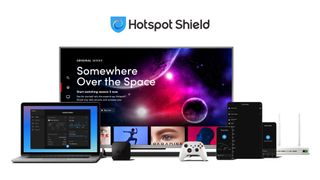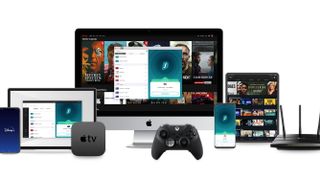Hotspot Shield vs Surfshark: which is the better VPN?
How to pick between these affordable, easy-to-use services

Let's face it, there are a LOT of VPNs out there. And they all seem to make promises to be the fastest, most secure and best at unblocking restricted services and apps.
Two of the most impressive providers out there are Hotspot Shield and Surfshark, and neither is shy about extolling their service's virtues. From Hotspot's electrifying speeds, to the latter's unlimited simultaneous connections. And one of the best things is that both boast some rock-bottom pricing.
Both hold a very admirable spot on our overall best VPN chart, too. So how do you go about choosing between them? That's the raison d' être for this article, in which we compare every aspect of both services - from speeds and usability, to privacy features and cost - so you can have confidence in the choice you ultimately make.
- TechRadar's Hotspot Shield review
- TechRadar's Surfshark review
First impressions and specs
Number of servers:
Hotspot Shield: 1,800+ / Surfshark: 3,200+
Server countries:
Hotspot Shield: 80+ / Surfshark: 65+
Maximum simultaneous connections:
Hotspot Shield: 6 / Surfshark: Unlimited
Money back guarantee:
Hotspot Shield: 45 days / Surfshark: 30 days
Lowest monthly cost:
Hotspot Shield: $2.49 / Surfshark: $2.49
Downloading any type of new software for the first time can feel intimidating, but both Hotspot Shield and Surfshark are among the VPN companies that make it as comforting and easy as possible to get started. Whether that be on a desktop client or their mobile VPN apps, these two services have some of the friendliest interfaces around (we'd even rate them as better in that department than the popular NordVPN).
Thinking specifically about the desktop apps, Surfshark has a stripped back interface that simply combines a big 'Connect' button with a list of popular server locations, and the option to jump on the fastest or closest servers.
Hotspot's main control panel is a bit busier, but without feeling overwhelming. As well as telling you the server location you're connected to, you also get digestible information on your IP, load time, latency and a handy speed test. Getting 'Quick Access' to specialist servers for gaming and streaming is only a click away.
Specs-wise, Surfshark has got Hotspot Shield licked when it comes to simultaneous device connections (unlimited plays six) and server count (3,200 almost doubles Hotspot's 1,800).
While the latter point is unlikely to cause too many issues day-to-day, Surfshark may swing your opinion if you do like to use your VPN on every laptop, phone, tablet, router, smart TV, games consoles and TV streaming device going. Indeed, because of the way that Hotspot runs with its own proprietary protocol, it actually means that using it on such a large breadth of different devices is tricky anyway.
Hotspot Shield vs Surfshark: Plans, pricing and trials
It's no surprise that both these providers feature in healthy spots on our cheap VPN countdown. If you're willing to commit for a few years of your chosen service, there aren't many other providers out there that can match what these two are up to - it's the main reason why you may be looking at one of these instead of the relatively costly ExpressVPN.
If you need something short term, then the prices are nothing to write home about - at around $13 each they're actually both pretty pricey. And their 'mid-range' tariffs aren't a lot better, with a year of Hotspot costing $7.99 a month, compared to Surfshark's 6 months at $6.49.
Nope, you have to look at the multi-year offers to really bring home the value.
Surfshark has been impressing us for a while with its 2-year plan that comes in at the equivalent of $2.49 per month. But now, Hotspot has come in and matched that rate with a special offer only available to TechRadar readers. If you're comfortable committing for three years instead of two, you'll now get Hotspot Shield for $2.49 a month as well.
If that sounds good to you (and, again, you won't find prices much cheaper for this kind of quality) then you can take additional comfort in knowing that both providers carry money back guarantees that let you cancel for a full refund - Surfshark's is 30 days and Hotspot's 45. You could also give Hotspot a whirl with its popular free VPN, but the strict data limits in place and the fact you can only connect to one server means that it is a far inferior experience.
Hotspot Shield vs Surfshark: Privacy and security
Surfshark and Hotspot play the security game in slightly different ways. The former's approach is more bog standard, offering an array of well-known VPN protocols to choose from including OpenVPN, IKEv2, the speedy WireGuard and Shadowsocks that's specifically there to help bypass banned websites in countries like China. We also like that there's a fully functional kill switch, a 'double hop' feature to divert threats and private DNS on every server.
Hotspot Shield has a much more unusual set up. While IKEv2 is now available, the main protocol you'll use is its magnificent-sounding Catapult Hydra. It's in-house technology that allows the provider to ensure the fastest server connection speeds possible (and they are fast), but doesn't compromise on protection. Although being off the OpenVPN grid means that it's harder to scrutinize what Hotspot is up to, cybersecurity giants like McAfee and Bitdefender utilise Catapult Hydra, so it must be doing something right!
On testing. we found Hotspot Shield's kill switch on its Windows 10 VPN client to be fantastic at avoiding leaks.
In short, there isn't much to choose between them here. Surfshark has the extra choice of protocols, while we admire Hotspot's commitment to and investment in its own proprietary version.
Hotspot Shield vs Surfshark: Logging
Surfshark claims only to keep information about your billing info and email address. That's it. Nothing else. And the fact it's based in the British Virgin Islands means that there's no obligation to collect anything else. If all correct, then that's very reassuring.
Hotspot on the other hand, admits that it keeps additional information like duration of sessions, domains accessed (although this is anonymized), device hashes and IP address. In one way, this feels more invasive than Surfshark,. But on the other hand, we rather like that the provider is so up front about this, and it goes to great pains to say that none of the information can be linked to your specific account or usage.
Unfortunately however, neither of these providers has recently brought in an independent auditor to carry out a full belt-and-braces tear down of their privacy policy and tools. It's one of the reasons why Express and Nord are just that little bit ahead of the pack in our eyes, and we'd love to see the same kind of absolute transparency coming from these two competitors.
- ExpressVPN vs NordVPN - compare the best in the business

Hotspot Shield vs Surfshark: Performance
If you've been thinking: "So far, so similar", then this might just be where a significant point of difference comes in.
Hotspot Shield has been in and around the top spot of our fastest VPN guide for a good while now, and that's largely thanks to the Catapult Hydra protocol we talked about above. It meant that in our testing, on a 6000Mbps line, we were consistently seeing speeds of 360-380 Mbps on US servers. That's extremely rapid. Let's put it this way... having Hotspot Shield turned on while you're gaming, torrenting or streaming is going to be barely detectable.
Compare that to the 150-210Mbps speeds we saw from Surfshark when we turned on WireGuard (or the mere 100-150Mbps on OpenVPN) and you can see that Hotspot is streets ahead on this criterion.
Hotspot Shield vs Surfshark: Netflix and streaming
The good news here is that in our testing we found both of these providers to be quite excellent streaming VPN companions. The bad news is that that's another reason why these two providers are so hard to split!
Whatever geo-restrictions we threw at these two, they vanquished them all. In our Netflix VPN testing, for example, both of these services were able to promptly give access to exclusive content on Netflix catalogs in the US, UK, Australia and Japan. The only blip we saw was from Hotspot, which weirdly struggled to unlock shows and films only watchable in Canada at our most recent time of asking.
BBC iPlayer, Hulu, Disney Plus and Amazon Prime Video were all unable to keep these two VPNs at bay.
Hotspot Shield vs Surfshark: Torrents
Surfshark is no slouch when it comes to trying to keep you safe and sound while you torrent. The moment it detects that you're exchanging torrent data, it automatically connects you to a specialized P2P server for the job.
But Hotspot Shield goes a few steps better. It has P2P support on all of its servers across the world, whether you're on a PC or mobile. That's super handy, and just means there's one less thing for you to think about when you're using the web.
Combine that with Hotspot Shield's lightning speeds, zero bandwidth restrictions and terrifically effective kill switch, and you've undoubtedly got yourself one of the very top VPNs for torrenting around.

Hotspot Shield vs Surfshark: Mobile apps
If you're looking for an Android VPN, then this section is almost redundant. The apps you'll get from the Play Store are like little Mini-Me's of the Windows client. Same easy interfaces, same handy kill switches, largely the same feature sets (although the IKEv2 protocol is missing from the Hotspot app). So if you're an Android user, stick with whoever has already swayed you so far.
The difference between the two is strangely much more pronounced when it comes to their iPhone VPN apps. And it's Surfshark's that impresses the most in this department. Again, it's really just like a mobile version of the full desktop version, retaining most of the same protocols, settings and features.
Hotspot's conversely - much like a lot of the competition - offers a somewhat underpowered iOS alternative. Gone are the handy auto-connect and auto-start functions; gone is the kill switch; gone are a whole bunch of other settings.
Hotspot Shield vs Surfshark: Support
We're delighted that these are two of the providers out there that have 24/7 live chat support on hand to make sure that you're able to troubleshoot issues with ease and help you get the most from your software. We tried both out during our testing, and were extremely happy with the advisors and their advice.
Both also have a wealth of help articles and FAQs on their sites, too.
Hotspot Shield vs Surfshark: which is better?
Wow... this is a very close-run thing. There isn't much at all to choose between these two services - not even the price! - so it may well come down to what you're more likely to use your VPN for.
If your main concern is pure speed, then Hotspot Shield is your choice. It has some of the quickest connection speeds of all the VPNs we tested. And they're reliable, too. While iOS loyalists should be more inclined to lean Surfshark-wards.
But remember... whichever you choose, you have the safety net of a money back guarantee if you don't get on with them. So effectively your choice is completely risk-free.
Get daily insight, inspiration and deals in your inbox
Get the hottest deals available in your inbox plus news, reviews, opinion, analysis and more from the TechRadar team.
Adam was formerly the Content Director of Subscriptions and Services at Future, meaning that he oversaw many of the articles TechRadar produces about antivirus software, VPN, TV streaming, broadband and mobile phone contracts - from buying guides and deals news, to industry interest pieces and reviews. Adam has now dusted off his keyboard to write articles for the likes of TechRadar, T3 and Tom's Guide.

